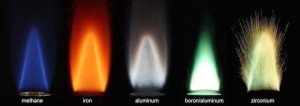
Credit: Alternative Fuels Laboratory/McGill University
A new study lays out a novel concept for using tiny metal particles — similar in size to fine flour or icing sugar — to power external-combustion engines in replacement for fossil fuels than other widely discussed alternatives, such as hydrogen, biofuels or batteries. “Technologies to generate clean electricity — primarily solar and wind power — are being developed rapidly; but we can’t use that electricity for many of the things that oil and gas are used for today, such as transportation and global energy trade.
“Using metal powders as recyclable fuels that store clean primary energy for later use is a very promising alternative solution.” notes McGill University professor Jeffrey Bergthorson, lead author of the new study published by journal Applied Energy.
Unlike the internal-combustion engines used in gasoline-powered cars, external-combustion engines use heat from an outside source to drive an engine. External-combustion engines, modern versions of the coal-fired steam locomotives that drove the industrial era, are widely used to generate power from nuclear, coal or biomass fuels in power stations.
The idea put forward by the McGill team takes advantage of an important property of metal powders: when burned, they react with air to form stable, nontoxic solid-oxide products that can be collected relatively easily for recycling — unlike the CO2 emissions from burning fossil fuels that escape into the atmosphere.
Using a custom-built burner, the McGill researchers demonstrated that a flame can be stabilized in a flow of tiny metal particles suspended in air. Flames from metal powders “appear quite similar” to those produced by burning hydrocarbon fuels, the researchers write.
Iron could be the primary candidate for this purpose, according to the study. Millions of tons of iron powders are already produced annually for the metallurgy, chemical and electronic industries. And iron is readily recyclable with well-established technologies, and some novel techniques can avoid the carbon dioxide emissions associated with traditional iron production using coal.
While laboratory work at McGill and elsewhere has shown that the use of metal fuels with heat engines is technically feasible, no one has yet demonstrated the idea in practice. The next step toward turning the lab findings into usable technology, therefore, will be to build a prototype burner and couple it to a heat engine.



